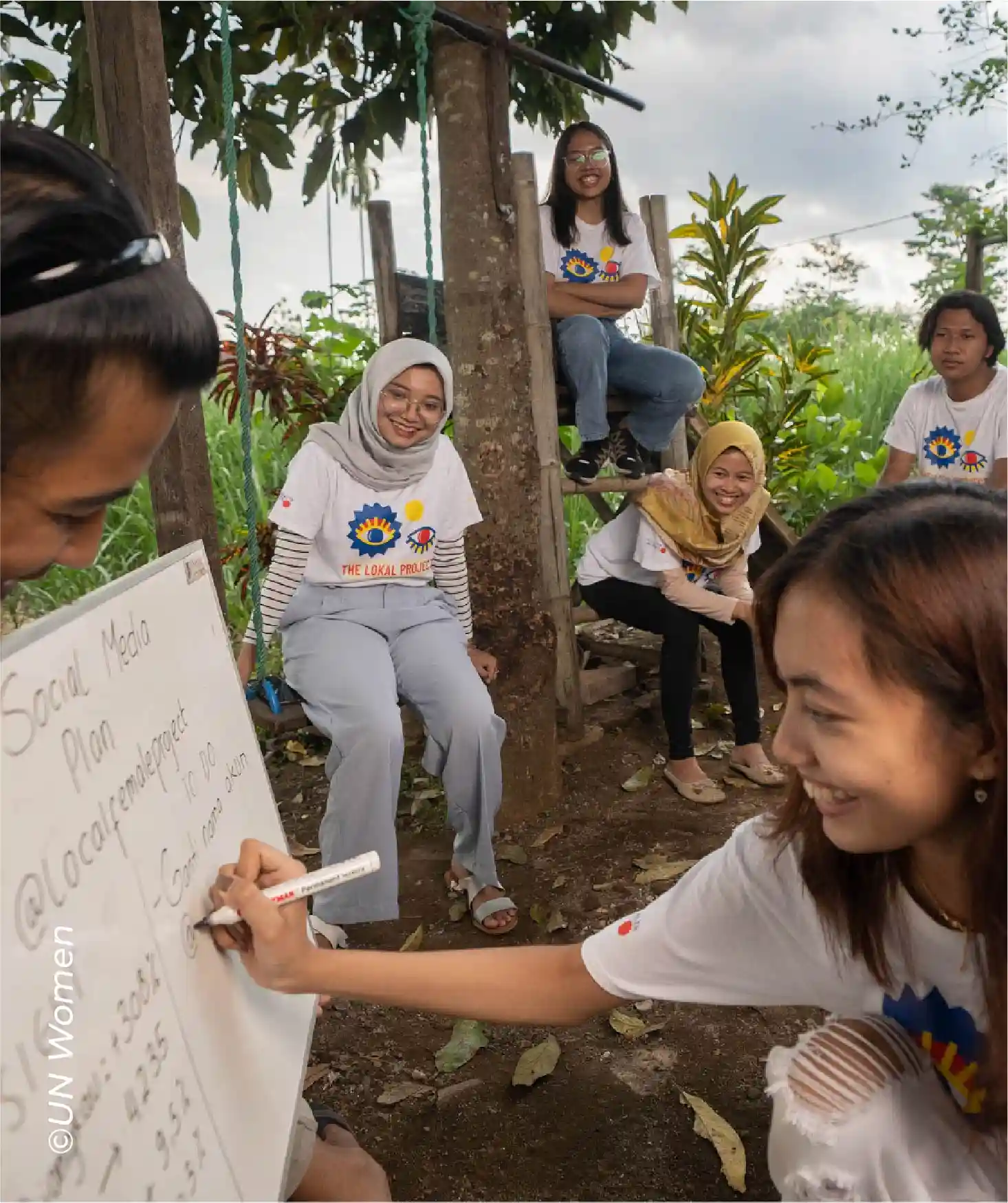United Nations In Indonesia
Country Results Report 2021
Tech, Innovation and Big Data-Driven Development



 The COVID-19 pandemic provided an additional impetus to accelerate data-driven solutions to ongoing developmental challenges in Indonesia.
The COVID-19 pandemic provided an additional impetus to accelerate data-driven solutions to ongoing developmental challenges in Indonesia.
In 2021, four years ahead of schedule, all 34 of the country’s provincial governments were using technology to deliver immunisation services. The UN’s SMILE digital platform had helped distribute more than 250 million COVID-19 vaccine doses to a population of some 270 million people by years’ end. Meanwhile, a software enhancement to SMILE enabled the platform to synergise service delivery between the Ministry of Health and Indonesia’s largest vaccine manufacturer, Biofarma. The government also deployed the One Data Vaccination System to facilitate real time monitoring of COVID-19 responses, with additional data inputs from UNICEF’s RapidPro monitoring system.
The World Health Organization and its partners undertook the first global assessment of 133 countries’ health data in 2021 using a bespoke analysis tool called SCORE, which is designed to strengthen countries’ capacity for health data collection, enable governments to monitor progress towards health-related SDGs, and facilitate evidence-based policymaking. Indonesia’s assessment found available data to track the progress of 68% of health-related SDG indicators. Based on this, the UN and Government partners conducted activities to strengthen data quality, including translating WHO’s data quality assurance toolkit into Indonesian. Ten Indonesian policymakers also took part in a regional conference on strengthening health information systems to support evidence-based decision-making.
The UN also employed innovative data collection systems to support Government interventions for children and families affected by COVID-19. For example, the UN supported the Government in vulnerability mapping and the registration of children affected by orphanhood using RapidPro—an open-source platform developed by UNICEF that allows users to input data via SMS, and other widely available communication platforms. The UN employed satellite imagery to assess the preparedness of schools and health facilities in remote jurisdictions.
In 2021, the UN provided technical assistance for the country to update its projection onf the HIV epidemic using the AIDS Epidemic Modelling tool to estimate the total resources that would be needed to control the epidemic. This included capacity building training on the modelling tool’s use and athe review of the efficacy of Indonesia’s HIV policy framework through the exercise of HIV National Commitments and Policies Instrument (NCPI) reporting; Global AIDS Monitoring reporting (GAM); the National AIDS Spending Assessment (NASA) reporting; and the Sustainability Index Dashboard (SID) reporting. The review’s findings helped the UN support the Government in creating a multisectoral strategy on HIV under the Coordinating Ministry for Human development and Culture and the Ministry of Health;s Health Sector National Strategic Plan on HIV 2020-2024. Technical assistance was also provided to strengthen monitoring of HIV programme implementation through the establishment of an HIV programme monitoring dashboard, which visualizes data from the Ministry of Health’s National HIV information system and community-based implementing partners.
The UN also supported Indonesia’s leadership in the Global Fast Track Cities to end AIDS initiative, and the ASEAN Cities Getting to Zero initiative, which includes 27 priority HIV districts in Indonesia. Under the latter initiative, the UN provided technical assistance to 27 city-level governments to conduct routine HIV treatment cascade analysis to review progress, identify bottlenecks and develop actionable plans to scale-up HIV treatment.
The UN incorporates data collection tools to monitor the SDGs across every sector. For example, the UN continues to build the capacity of Indonesia’s fisheries to input data into an e-log book the Ministry of Marine Affairs and Fisheries is using to analyse the state of marine life at two pilot sites, with plans to expand to a third pilot site in 2022. With support from academia, the UN launched a study designed to strengthen the Ministry of Agriculture’s national food security and nutrition early warning surveillance systems. Another UN project, called GOLD-ISMIA, aims to persuade artisanal gold miners to phase out dangerous mercury use, by making available non-mercury-based technologies for gold processing. In coordination with the Ministry of Environment and Forestry, the UN launched a digital application called Jari Emas (golden finger), which monitors the avoidance of mercury in artisanal and small-scale gold mining communities. By February 2022, it had logged the avoidance of 6.22 metric tonnes of mercury in locations where the UN introduced alternative processing technologies.